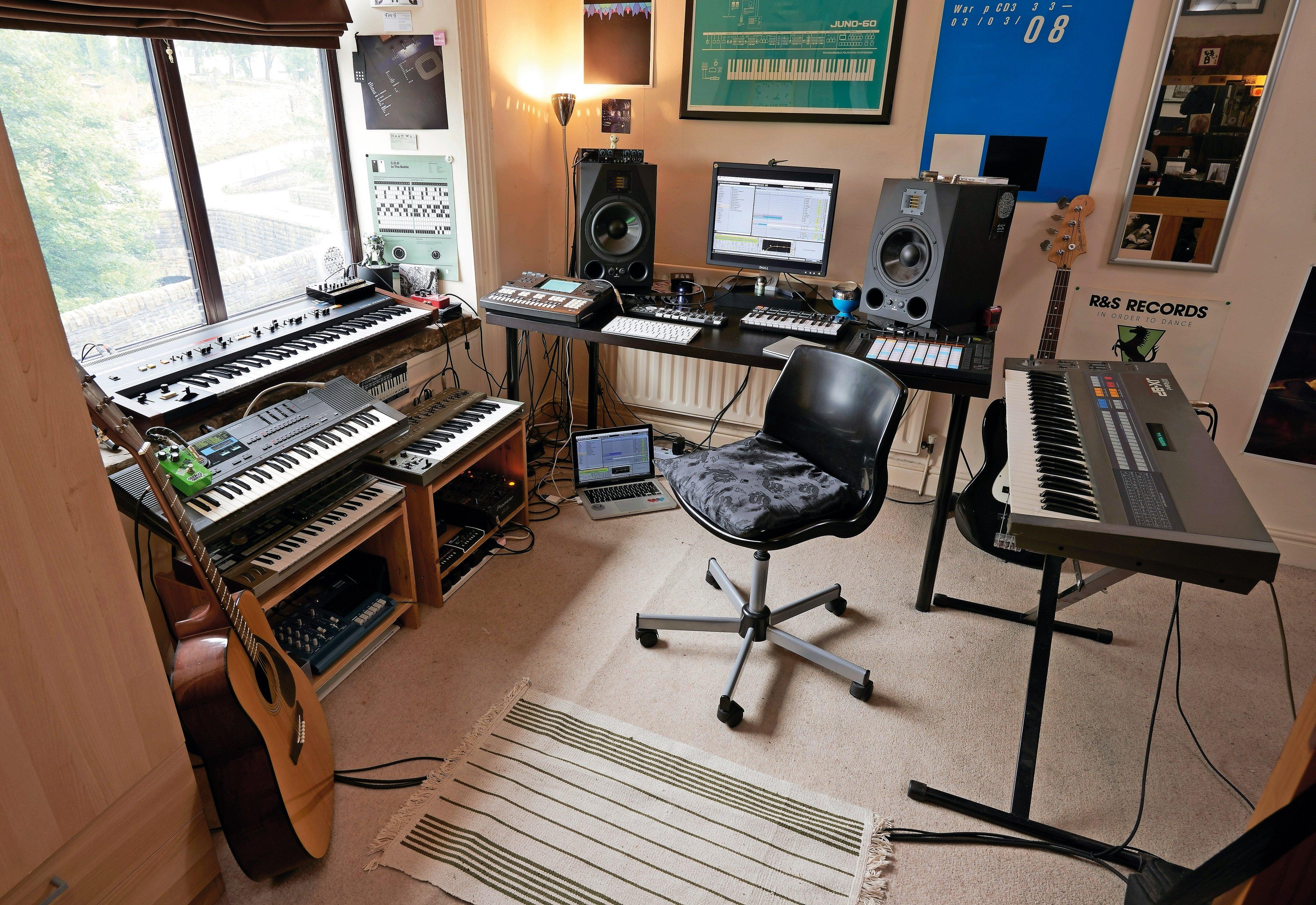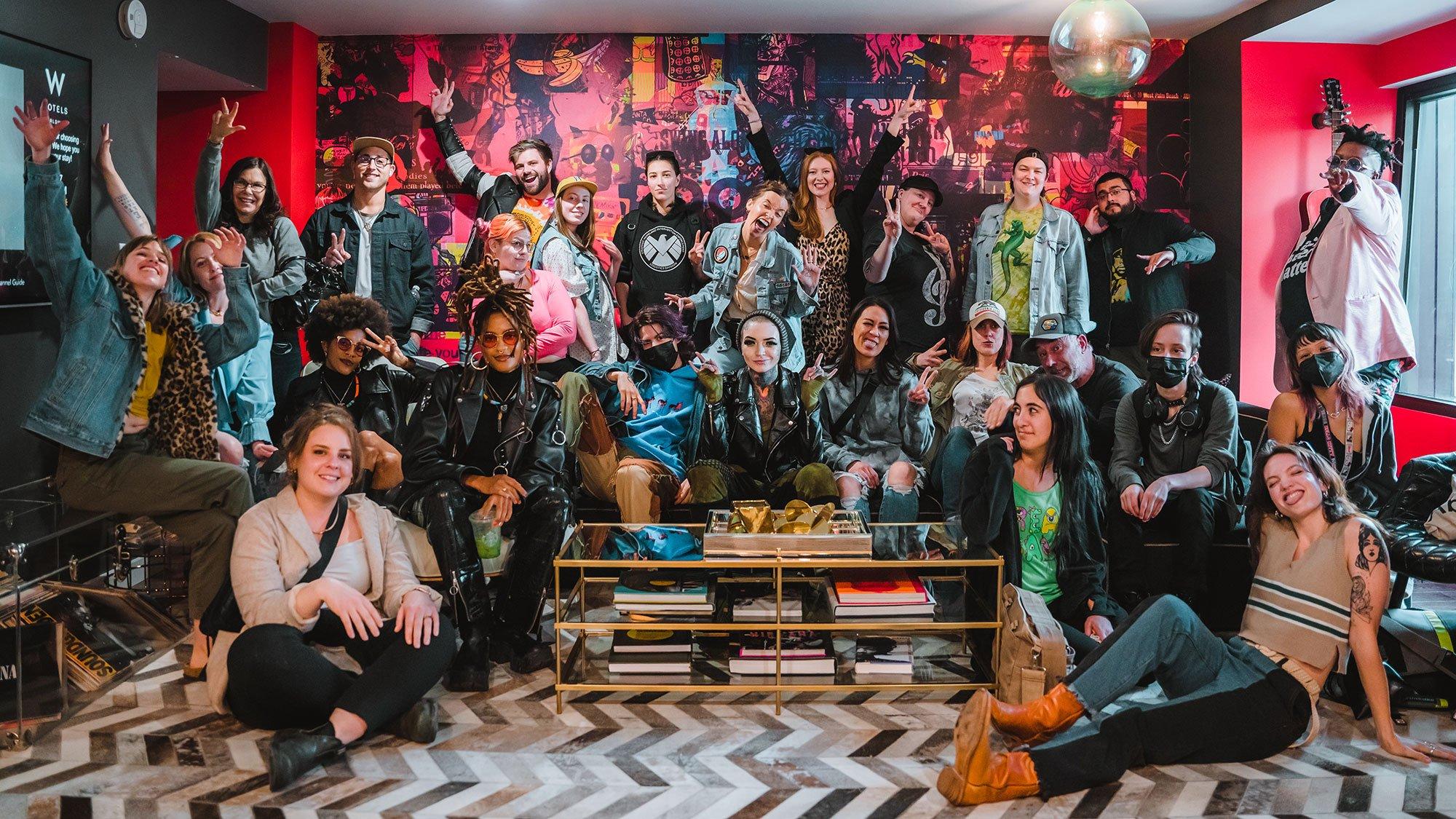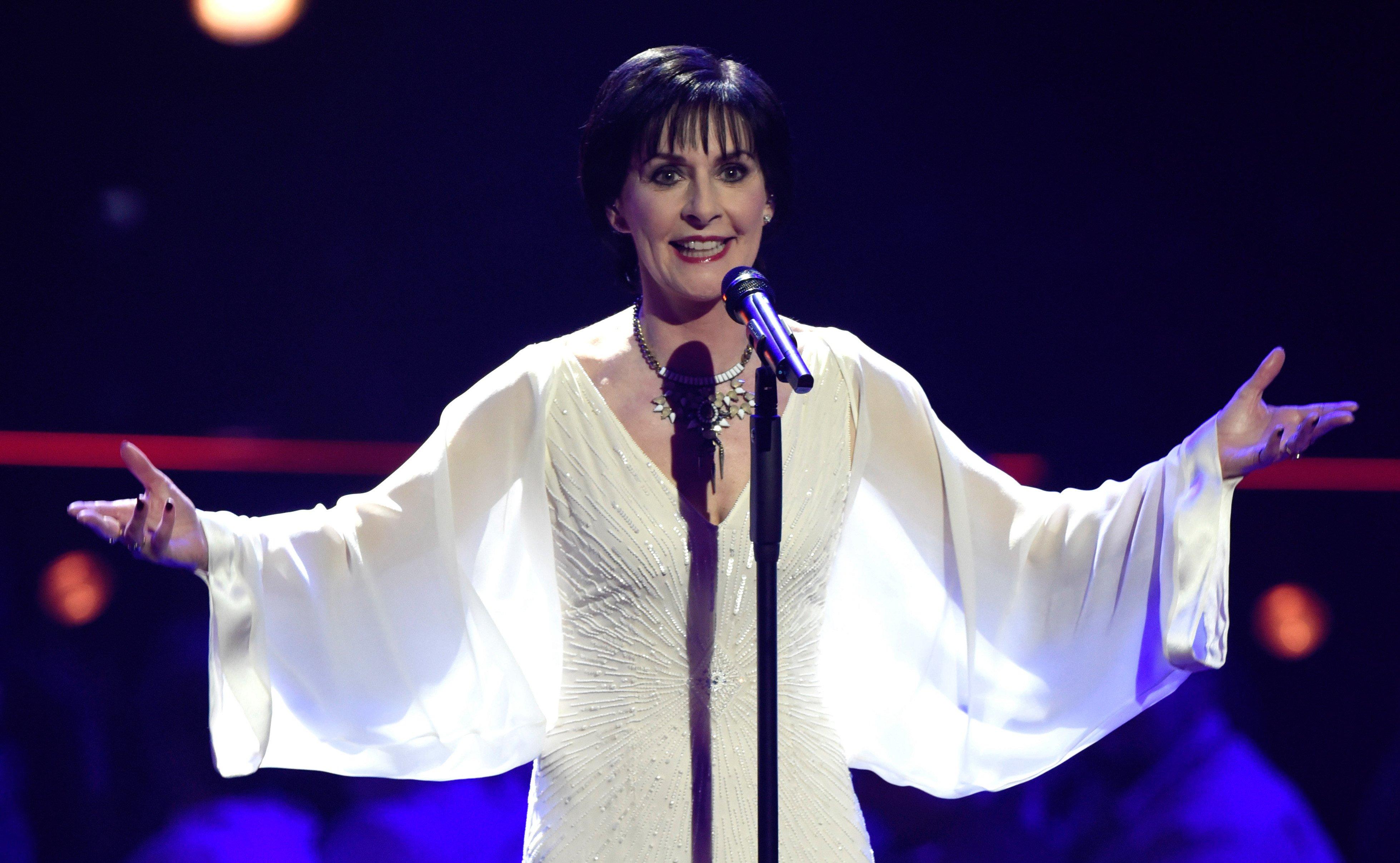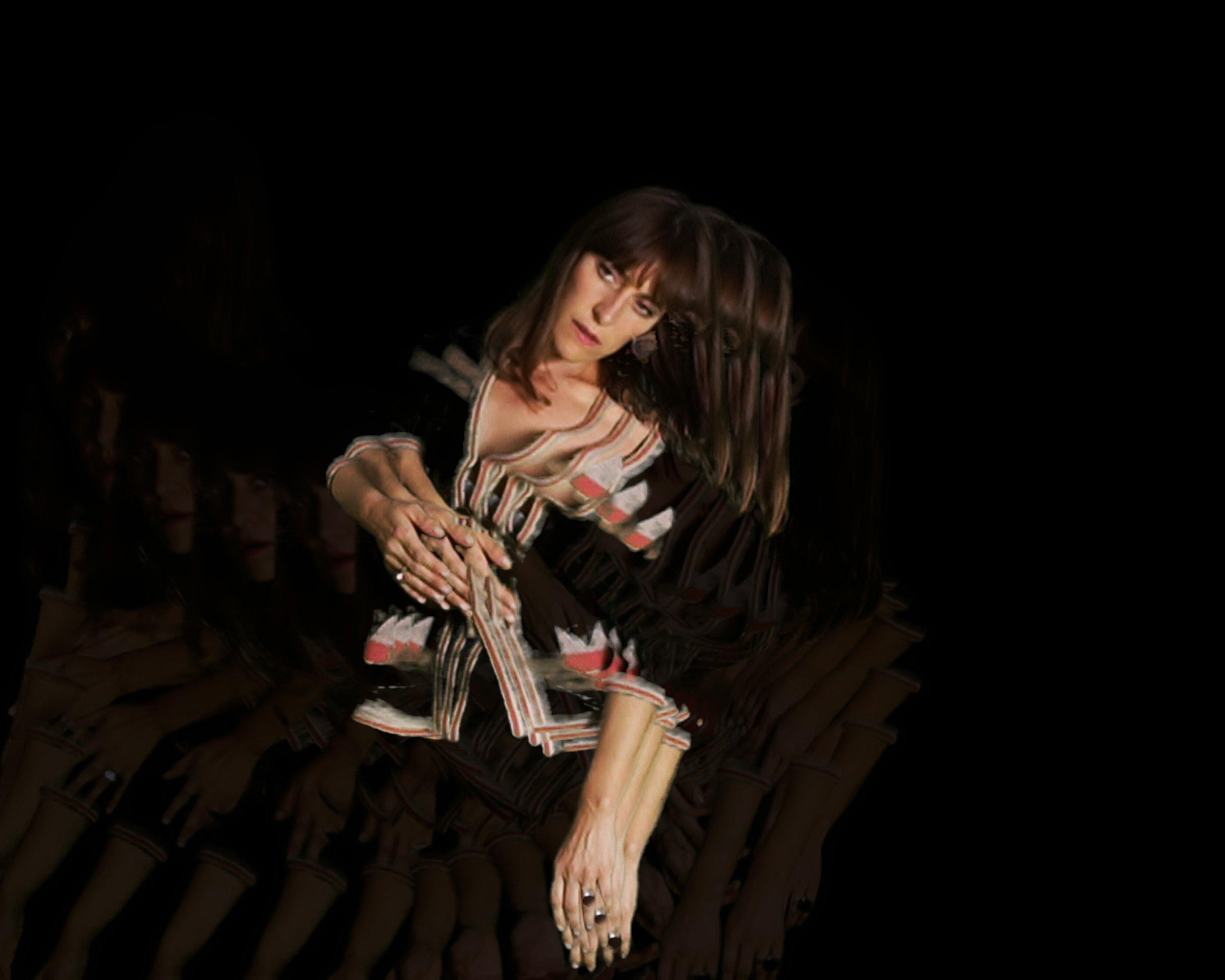Back when LP Giobbi played synth in an all-woman band called LJ Laboratory, seeing Grimes perform and learning that she produced all her own music was a game changer. Although she'd been in music for a while, she'd never thought about producing her own. This is where she felt firsthand the power of visual representation — being able to see and imagine herself in spaces she hadn't before.
After the Oregon-born artist found her way into DJing and music production, her friendship and fruitful creative partnership with GRAMMY-nominated dance pop duo SOFI TUKKER gave her the support she needed to grow in dance music and find her artistic voice.
Today, the "All In A Dream" producer is doing all she can to pay it forward. Through Femme House — an education program and party series that supports women and nonbinary people in production and DJing — Giobbi, co-founder Hermixalot, education lead Mini Bear and their small-but-mighty team are working hard to bring provide useful resources, workshops and a platform to as many people as they can.
“My partner is in the music industry and he does so much business on the golf course. We need our golf course, where we're building friendships, booking each other and collaborating on each other's work — all those things that happen when you have community,” LP Giobbi recently told GRAMMY.com. She has witnessed Femme House’s in-person workshops as a fruitful example of this.
Given that only 6.5 percent of the producers of songs on the Billboard Hot 100 in 2023 were female (in 2022, that number was 3.4 percent), there's a lot of work to be done to make a male-dominated profession and industry less so.
On March 1, Femme House released their second compilation album on Insomniac Records, highlighting the wealth of emerging women in dance music. The all-female tracklist features Hermixalot and educators Mary Droppinz and Mini Bear, along with a talented cast of newer names and rising acts including Baby Weight, PAUZA, Lisbona Sisters, and ZOF. Given the massive reach Insomniac has in electronic music, the release will likely expose them to a new, wider fanbase and lead to other opportunities.
"At a time when the music industry was recognizing a problem, but not really providing any solutions or being proactive, LP Giobbi and Hermixalot took it upon themselves to do the hard work and actually create an entity that puts money where their mouth is," Baby Weight said via email. "The amount of opportunities they have been able to provide through workshops and sponsorships and takeovers at festivals is honestly super inspiring — and it should be proof that if you really want to make a change, it can be done."
Femme House has also intentionally created safe spaces for all women and queer people, not just white cis-gender women.
"As a transgender woman, I sometimes feel like I don’t belong with the other girls in the industry and the cisgender straight males don’t understand me either," Baby Weight added. "The Femme House community, however, didn’t blink and welcomed me with open arms and acknowledged me for who I am. So being able to be a part of this tapestry, and provide that same validation to others out there who may have felt the same way, means the world to me."
Since Femme House launched in 2019, they've educated over 12,000 women and gender-expansive people through online classes and free workshops. They also offer six annual scholarships for creators in the BIPOC and LGBTQIA+ community, which include free gear, one-on-one classes, and professional development.
"One of the reasons I decided to teach music production is because I knew how important it was to create safe and supportive learning environments for people who haven't traditionally had spaces where they can take up space and wholly be themselves," Mini Bear wrote via email. "I want to create the kind of space I wish existed when I was starting out, and to uplift those who have been underrepresented and shut out."
Femme House has grown at an impressive rate since its founding, adding new classes and workshops as well as more femme-centered parties and releases. They also sell affordable go-at-your-own-pace online courses on production, and a wide offering of free monthly classes on specific elements of DJing, production techniques, songwriting and more.
Read on to hear from LP Giobbi about the work Femme House is doing to bring more women into dance music and production.
Let's start with the Femme House Vol. 2 compilation album. It follows the first Femme House album that came out on Insomniac Records in 2022, but how did this one come together and how did you choose the artists and tracks for it?
Insomniac has been an amazing partner on this. I worked closely with their A&R team on both the first and second compilation. I had a list of artists in my mind that have been really supportive of the mission and that we've worked with.
I had some ideas in my head and then sat within the Insomniac team. They had a lot of great ideas and turned me on to some artists that they had been supporting early on, so I got to discover new music through them. I really want to reiterate how amazing Insomniac has been on this mission. They do the biggest electronic festivals in the U.S. and so they have such a [huge] platform and a lot of power in the industry. So to see them put their hand up and care and realize Maybe we need to work harder on making sure our lineups are diverse [is really awesome]. How do you get diverse lineups? You have to help build artists from the beginning.
They really are aware of what this compilation could do for an artist and how it can help them and build their story. After we finally put it together — they were like "We really want to keep supporting these artists to eventually book them for EDC and our other big festivals." They really truly are partners in the sense of caring not just about this one compilation but the larger industry at whole.
How else is Insomniac helping you support women in building their DJ careers?
It's this chicken or egg thing that we really work hard on at Femme House: How do you get booked for a festival? By getting booked for a festival [before]. Promoters will look at other lineups and see who's playing. So we do a lot of stage takeovers with Femme House [with slots for artists who've never played a festival].
Insomniac was the first [promoter/event brand] to reach out to us and asked us to do one at EDC. We were able to book a full female and gender-expansive lineup. That's where our partnership started with them. Most of the folks who played that [EDC with us], it was their first time playing a festival. It really allowed them to start building their story and sort of sell what they're capable of and what they've done. Whenever we do stage takeovers, we save the opening slot for [the winner of] a contest we run where if you've never played a festival before, you can send us a mix.
Your track with Femme House co-founder Hermixalot that opens the compilation reimagines the Rapture's "How Deep Is Your Love"— the first dance track you fell in love with. How did y'all approach covering such a memorable tune while giving it your own touch?
My fiancé is the one who showed me electronic music and the Rapture, which was kind of a gateway for me. I remember listening to "How Deep Is Your Love" [when we first started dating] and having the most epic dance party... It was probably the most fun five minutes of my life. I always wanted to have a version of that song I could play in my sets. I made an [instrumental cover] track with harder hitting drums, and started playing it out and sets. I would throw in that piano line over a bunch of different tracks and was always weaving it throughout [my set] because it's so simple but it's so catchy.
I played a festival set and Hermixalot was like, "That 'How Deep Is Your Love' [cover] is so sick, I love that track." Our musical tastes don't usually overlap; she's more R&B and everything outside dance music. I asked if she wanted to sing on it. She came with such a cool, unique [take]. She did a few different versions — some that had her more R&B flair to it where she did a few different runs — and we ended up piecing them together.
To get to cover my favorite dance track with the person that helped me believe I could be an artist and who created Femme House with me — where our mission is to be what you haven't normally traditionally seen — just so it feels so fitting and really special.
Can you talk about the Femme House tour you did last year, where you had workshops in each city you headlined during your Light Places tour?
The workshops are free. They're safe spaces for women and gender-expansive folks, but all are welcome. I would play the show and an afterparty and then get on the first flight out because I needed to get to the workshop [in the next city], which was happening in the daytime. I would be [so tired] and then show up at the workshop and feel so fueled [by it].
We partnered with Ableton who brought on their female certified trainers in each city. I think there's only seven, which is like two percent of their trainers, but talk about a company that really cares about the mission. They have been so wildly supportive.
The workshop was Intro to Ableton, so we were targeting newer users. [The class helps you] get comfortable opening the program, loading a track and starting your idea, which sometimes can be the scariest part. We really wanted to focus on the basics and try to reach new people because once you're in, we have all sorts of online courses that cover topics way more in-depth.
We also had our lead educator, Mini Bear, [a.k.a.] Lauren Kop, who's on the compilation, did a few workshops. The opener for the tour is an amazing artist named Bad Snacks, who studied electronic music at Berklee School of Music and is one of the most proficient humans in Ableton I've ever met. She taught some of the workshops as well.
What else is coming up for Femme House in 2024?
We're doing a big activation soon at Miami Music Week. We are [also] partnering with Armada [Music] to do an educational series with them and their Armada University. We are also doing a few more festival stage takeovers that I can't announce yet. We'll have that contest for the opening slots to make sure we're booking somebody that's never gotten to play festival before.
[Femme House is] getting so many awesome incoming opportunities. The education is first and foremost, we'll continue to have monthly production and DJ courses and we are adding [online] show photography courses, which I'm really excited about.
The photographer I tour with a lot, Sarah [Northrop] — SarTakesPics is her Instagram — is gonna teach. Touring photography is also a male dominated industry. On the last tour, she started a program where at every one of my shows she picked a photographer to shadow. She would meet with this person and sit with them for an hour, share her knowledge, how she got there and let that person ask questions. That person would do a photo shoot with me to practice portraits, and they would shoot the show as well and have full access to the stage. It was an incredible program, so we'll keep doing that. She'll have a shadow at a few events at Miami Music Week.
And we have a series called Backstage Pass where we invite folks from the industry, not artists or music makers, but agents, promoters and managers and folks come and talk. Our community Zooms in and the [special guest] tell their story on how they got where they are.
I think the contacts part is so important because some people start from nowhere. You had Sofi Tukker, who you've talked about being so vital to your career.
Yeah, oh my god. SOFI TUKKER had some success and they met the head of electronic [music] at Spotify and sent them my songs — they were promoting [their own] songs, but they sent mine. That is what changed everything for me, and then allowing me [the space to] learn how to DJ. That's why Femme House is so important to me, because the power of an artist supporting another artist is life changing.
I just launched a label this year, Yes Yes Yes, in partnership with Defected. There's one artist I just signed, Mascolo — how Sophie and Tucker felt about me, I feel about this artist. I'm gonna bring him on tour with me. I'm releasing his first records at the end of April.
I'm sick of talking about myself and seeing myself in flyers. This artist has given me new energy again. This is so much more fun to me; to listen and believe in their music and see the little seeds of growing their own fan base.
He's the most talented songwriter, producer and artist I've ever been in a room with. He was signed with Ryan Tedder, so he was writing pop songs for massive pop stars. He started showing me some of his dance tunes. And I was like, "Dude, what?" His music is very different but he's like a Frank Ocean as far as a freak genius. I believe in him so f—ing much. I believe in him more than I believe myself. This feeling of deep conviction over somebody else is a really beautiful, powerful feeling.
I think we all need champions and affirmations, even as simple as when someone compliments your work.
SOFI TUKKER gave me a stage, literally started a label to release my music—they did everything for me. But the biggest thing they did for me was they believed. There's no greater gift than the power of belief because then you start believing maybe it is possible. It's not just the belief, it's all the work you have to do to get there. That gift allowed me to do everything I needed to do to actually sustain myself as an artist. I'm so excited to give that to somebody that I really believe in.
What do you think we can start doing now as a dance music community to support more diversity and equity across the genre and scene?
We at Femme House really believe that this change [needs] allies. It cannot just be the underrepresented people doing all the f—ing work. That goes for all movements, I believe. It takes the gatekeepers. It takes the people who are booking the festivals to go, "Wait, is this diverse enough?" When I get booked, I have my agent send out this thing that says if you're still in the process of booking your lineup, here's a bunch of women and gender expansive artists. I had a big learning lesson when one of the first Femme House workshops was all white women. That is why we started the BIPOC scholarship.
The most amazing thing about Femme House has been to see how many of these gatekeepers have come to us saying "How can we make a change.?" On a festival, 90 percent of the tickets are sold by the headliners. So that means that the undercard, the other 50 artists that you're booking, you have so much opportunity to diversify that bottom half of the festival bill. And I do believe that slowly but surely that's happening.
The more women we have on these lineups, the more people in the audience will, subconsciously or consciously, go Oh! That would be a possibility for me. Then they'll do the work if they want to and slowly everything changes.
What are your biggest dreams for Femme House and for women and non-binary representation in dance music and music production?
My biggest dream is to have anybody believe they can do anything. At Femme House, we don't expect having more female DJs or producers will change the world. But having anybody believe they can do anything will change the world. Our outlet just happens to be electronic music, but I would love for everybody to see themselves represented in whatever they want to do and believe they can do it.
You had a really big year last year, which included remixing Taylor Swift's "Cruel Summer." How did that official remix come about and how did you feel taking it on?
I was in Marbella, Spain, about to go on stage and my manager called me. He's like, "I know you're going on stage right now but Taylor Swift reached out to work with you." And I was just like, "Wait, what? She knows my name?" [Chuckles.] I was so confused and blown away. [When] I got off stage, I immediately started working on it because I wanted to beast mode it without even having to be asked for it. She listened to it and liked it. I had no idea about a release or anything else.
I was asleep on an airplane flying to Amsterdam for [Amsterdam Dance Event]. My tour manager comes over and wakes me up to tell me Taylor Swift is gonna release the remix tonight. These things happen a lot and oftentimes nothing will come from it. You never say anything until it's actually happened. [Laughs.] I couldn't believe it. When I landed, literally every human I've ever met that maybe had my number had contacted me. Then I saw that she tagged me on her Instagram [post]. The last person Taylor Swift tagged in an Instagram post was Beyoncé, so that was crazy. She definitely did help change my career.
5 Women Essential To Electronic Music: TOKiMONSTA, Shygirl, Nina Kraviz & More





